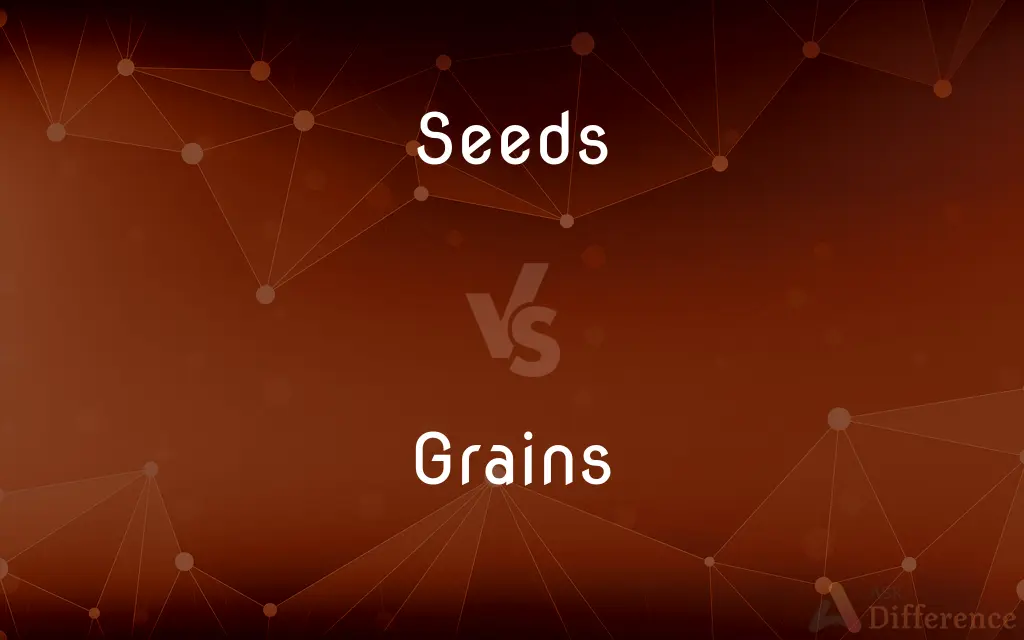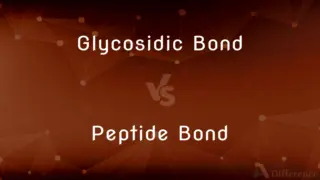Seeds vs. Grains — What's the Difference?
Edited by Tayyaba Rehman — By Fiza Rafique — Published on January 8, 2024
Seeds are embryonic plants enclosed in a protective outer covering, while grains are seeds of specific grasses used for food.

Difference Between Seeds and Grains
Table of Contents
ADVERTISEMENT
Key Differences
Seeds are the embryonic plants that can grow into a new plant. Grains, on the other hand, are a type of seed specifically harvested from cereal grasses.
Seeds come from various plant species, including fruits and vegetables. Grains are primarily from cereal crops like wheat, rice, and corn.
All grains are seeds, but not all seeds are grains. Seeds include a wider variety, while grains are more specific.
Seeds often have protective shells or coatings. Grains usually have a hard outer layer that is often removed during processing.
Comparison Chart
Origin
From various plant species
From cereal grasses
ADVERTISEMENT
Variety
Wide variety
Specific to cereal crops
Usage
Planting, food, oils
Primarily food, flour
Processing
Varies, often minimal
Often milled or processed
Nutritional Value
Varied, often nutrient-rich
Carbohydrate-rich, often refined
Compare with Definitions
Seeds
Embryonic plants with a protective outer covering.
Planting these seeds will yield a beautiful garden.
Grains
Often processed into flour or meal.
Wheat grains are milled to produce flour for bread.
Seeds
Can produce oil, such as sunflower or sesame seeds.
Sesame seeds are pressed to extract oil for cooking.
Grains
Sometimes refined to remove the bran and germ.
White rice is a grain that has been refined.
Seeds
Integral in the reproductive cycle of plants.
Seeds dispersed by wind help propagate the species.
Grains
A small, dry, one-seeded fruit of a cereal grass, having the fruit and the seed walls united
A single grain of wheat.
Gleaned the grains from the ground one at a time. Also called caryopsis.
Seeds
Come in various sizes, shapes, and colors.
Pumpkin seeds are popular for roasting and snacking.
Grains
The fruits of cereal grasses especially after having been harvested, considered as a group
The grain was stored in a silo.
Seeds
A mature plant ovule containing an embryo.
Grains
A cereal grass
Wheat is a grain grown in Kansas.
Seeds
A small dry fruit, spore, or other propagative plant part.
Grains
Cereal grasses considered as a group
Grain is grown along the river.
Seeds
Seeds considered as a group
A farmer buying seed.
Grains
A relatively small discrete particulate or crystalline mass
A grain of sand.
Seeds
The seed-bearing stage of a plant
The grass is in seed.
Grains
A small amount or the smallest amount possible
Hasn't a grain of sense.
Seeds
A larval shellfish or a hatchling fish
Released scallop seed in the bay.
Grains
(Aerospace) A mass of solid propellant.
Seeds
An egg or cocoon of certain insects
Silkworm seed.
Grains
Abbr. gr. A unit of weight in the US Customary System, an avoirdupois unit equal to 0.002285 ounce (0.065 gram).
Seeds
A tiny bubble in a piece of glass.
Grains
The markings, pattern, or texture of the fibrous tissue in wood
Cherry wood has a fine grain.
Seeds
(Medicine) A form of a radioactive isotope that is used to localize and concentrate the amount of radiation administered to a body site, such as a tumor.
Grains
The direction of such markings
Cut a board with the grain.
Seeds
A source or beginning; a germ
The seed of an idea.
Grains
The side of a hide or piece of leather from which the hair or fur has been removed.
Seeds
A small amount of material used to start a chemical reaction.
Grains
The pattern or markings on this side of leather.
Seeds
A small crystal used to start a crystallization process.
Grains
The pattern produced, as in stone, by the arrangement of particulate constituents.
Seeds
A cell that disperses, especially a cancer cell that spreads from a primary tumor to another location in the body.
Grains
The relative size of the particles composing a substance or pattern
A coarse grain.
Seeds
Offspring; progeny.
Grains
A painted, stamped, or printed design that imitates the pattern found in wood, leather, or stone.
Seeds
Family stock; ancestry.
Grains
The direction or texture of fibers in a woven fabric.
Seeds
Sperm; semen.
Grains
A state of fine crystallization.
Seeds
(Sports) A player who has been seeded for a tournament, often at a given rank
A top seed.
Grains
Basic temperament or nature; disposition
It goes against my grain to ask for help.
Seeds
To plant seeds in (land, for example); sow.
Grains
An essential quality or characteristic
"Toughness as a virtue ... is, needless to say, fully embedded in the American grain" (Benjamin DeMott).
Seeds
To plant (a crop, for example) as seeds in soil.
Grains
(Archaic) Color; tint.
Seeds
To remove the seeds from (fruit).
Grains
To cause to form into grains; granulate.
Seeds
To furnish with something that grows or stimulates growth or development
A bioreactor seeded with bacteria.
Grains
To paint, stamp, or print with a design imitating the grain of wood, leather, or stone.
Seeds
To disperse to, as cancer cells
Organs seeded by circulating tumor cells.
Grains
To give a granular or rough texture to.
Seeds
To disperse or transfer (cancer cells, for example)
A needle biopsy that seeded cancer cells into adjacent tissue.
Seed stem cells onto collagen gels.
Grains
To remove the hair or fur from (hides) in preparation for tanning.
Seeds
(Meteorology) To sprinkle (a cloud) with particles, as of silver iodide, in order to disperse it or to produce precipitation.
Grains
To form grains
The corn began to grain.
Seeds
To arrange (the drawing for positions in a tournament) so that the more skilled contestants meet in the later rounds.
Grains
Plural of grain
Seeds
To rank (a contestant) in this way.
Grains
Infl of grain
Seeds
To help (a business, for example) in its early development.
Grains
Seeds of cereal grasses like wheat, rice, or corn.
Grains such as rice are staple foods in many cultures.
Seeds
To sow seed.
Grains
Major source of carbohydrates in the human diet.
Whole grains provide essential nutrients and energy.
Seeds
To pass into the seed-bearing stage.
Grains
Integral in agriculture and food production.
Farmers harvest grains for both human and animal consumption.
Seeds
(Medicine) To disperse and often multiply, as cancer cells.
Seeds
Set aside for planting a new crop
Seed corn.
Seed potatoes.
Seeds
Intended to help in early stages
Provided seed capital for a fledgling business.
Seeds
Plural of seed
Seeds
Infl of seed
Seeds
Often used for planting or as a source of food.
Chia seeds are a nutritious addition to smoothies.
Common Curiosities
What are seeds?
Seeds are embryonic plants enclosed in protective outer coverings.
Do seeds have nutritional value?
Many seeds are nutrient-rich, providing vitamins, minerals, and oils.
What defines grains?
Grains are the seeds of cereal grasses like wheat and rice.
What's the difference in processing between seeds and grains?
Grains are often milled; seeds' processing varies widely.
Are all grains seeds, but not all seeds grains?
Yes, all grains are seeds, but not all seeds are grains.
Can all seeds be eaten?
Not all seeds are edible; some are poisonous or inedible.
What's the primary use of grains?
Grains are primarily used as food, often as staples in diets.
Do grains contain protein?
Grains contain protein, but the amount varies by type.
Can seeds be used for oil?
Certain seeds, like sunflower or sesame, are used to produce oil.
Are seeds used in agriculture?
Seeds are essential in agriculture for growing new plants and crops.
Are grains always processed?
Grains are often processed, but whole grains are less altered.
Is rice a grain?
Yes, rice is a type of grain.
Do seeds contribute to plant reproduction?
Yes, seeds play a crucial role in plant reproduction.
Is corn considered a grain?
Yes, corn is classified as a grain.
Can grains be whole or refined?
Grains can be whole (less processed) or refined (more processed).
Share Your Discovery

Previous Comparison
Glycosidic Bond vs. Peptide Bond
Next Comparison
Chlorhexidine vs. ChloroxylenolAuthor Spotlight
Written by
Fiza RafiqueFiza Rafique is a skilled content writer at AskDifference.com, where she meticulously refines and enhances written pieces. Drawing from her vast editorial expertise, Fiza ensures clarity, accuracy, and precision in every article. Passionate about language, she continually seeks to elevate the quality of content for readers worldwide.
Edited by
Tayyaba RehmanTayyaba Rehman is a distinguished writer, currently serving as a primary contributor to askdifference.com. As a researcher in semantics and etymology, Tayyaba's passion for the complexity of languages and their distinctions has found a perfect home on the platform. Tayyaba delves into the intricacies of language, distinguishing between commonly confused words and phrases, thereby providing clarity for readers worldwide.












































